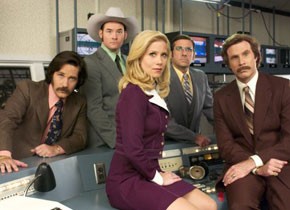Premiere:
"Anchorman" and "Talladega Nights" by Will Ferrell and Adam McKay
November 16 and 18, 2009
Since the mid-1990s American film comedy has undergone a sharp transformation. Centered around filmmakers and comedians like Jim Carrey, the Farrelly Brothers, Ben Stiller, Adam Sandler and Judd Apatow (who are also connected with each other through various creative networks), mainstream comedy has adopted a new tone: It has become considerably coarser in dialogue and action, but it also shows an unusual awareness of social and pop cultural issues and an underlying humanism that somehow accommodates a considerably more “vulgar” surface.
Will Ferrell, the "loudest, driest, and most fearless comic actor working today,” according to the Village Voice, is a principal figure of this new generation. Like Stiller (with Wes Anderson) and Sandler (with Paul Thomas Anderson), Ferrell also has a subtle side (see Marc Forster's Stranger Than Fiction, for instance) – but he owes his fame in the U.S. to other incarnations: his pompous George Bush parody (on Saturday Night Live, and as a stage production) and summer blockbusters, in which the comedian pushes the character of the enthusiastically regressive White Man-child to the extreme.
Ferrell’s two most successful comedies to date (co-written by him and Adam McKay, directed by McKay) have hardly had any impact in Europe and were not released in Austria: Anchorman: The Legend of Ron Burgundy (2004) and Talladega Nights: The Ballad of Ricky Bobby (2006). Both films are finally receiving their belated Austrian premiere at the Filmmuseum. They follow in a long tradition of Filmmuseum Tributes (to Karl Valentin, WC Fields, Laurel & Hardy, Mae West, the Marx Brothers, and many others) which is based less on the art of montage or mise-en-scène than on the physical and verbal craft of comedian-authors who create new archetypes.
Anchorman is the story of a local TV newscaster in the mid-1970s named Ron Burgundy whose macho throne is threatened when the feminist Zeitgeist suddenly lands him with competition by a feminist competitor (Christina Applegate). Burgundy’s besieged buddies include Paul Rudd, Steve Carrell and Seth Rogen, three names who have recently become as important to American film comedy as the two magnificent co-stars of Talladega Nights: John C. Reilly (as Farrell’s best friend) and Sacha Baron Cohen (as his French nemesis). The subject of Talladega Nights is even more “American” than that of Anchorman, and captured with near-documentary fervor in glorious Cinemascope: Ferrell plays Ricky Bobby, an exceptionally gifted NASCAR racer who is almost destroyed by his uncontrollable anger and tragic family history. In reviewing this film, A.O. Scott of the New York Times bravely confronted his well-mannered and educated readership: “This movie is the real thing. It’s finger-lickin’ good. It’s eatin’ good in the neighborhood. It’s the King of Beers. It’s Wonder Bread.”
